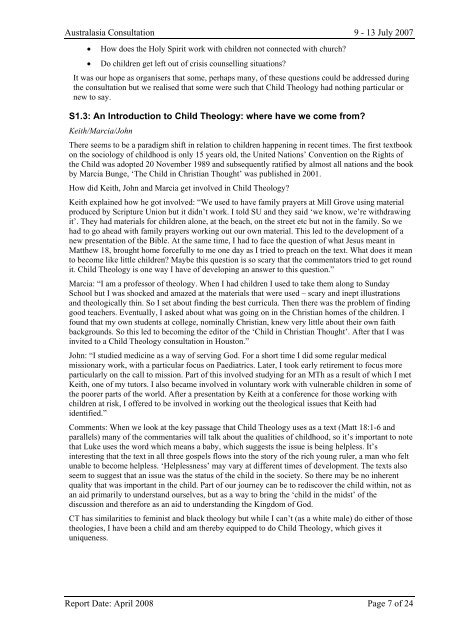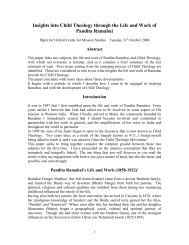View Sample - Child Theology Movement
View Sample - Child Theology Movement
View Sample - Child Theology Movement
Create successful ePaper yourself
Turn your PDF publications into a flip-book with our unique Google optimized e-Paper software.
Australasia Consultation 9 - 13 July 2007• How does the Holy Spirit work with children not connected with church?• Do children get left out of crisis counselling situations?It was our hope as organisers that some, perhaps many, of these questions could be addressed duringthe consultation but we realised that some were such that <strong>Child</strong> <strong>Theology</strong> had nothing particular ornew to say.S1.3: An Introduction to <strong>Child</strong> <strong>Theology</strong>: where have we come from?Keith/Marcia/JohnThere seems to be a paradigm shift in relation to children happening in recent times. The first textbookon the sociology of childhood is only 15 years old, the United Nations’ Convention on the Rights ofthe <strong>Child</strong> was adopted 20 November 1989 and subsequently ratified by almost all nations and the bookby Marcia Bunge, ‘The <strong>Child</strong> in Christian Thought’ was published in 2001.How did Keith, John and Marcia get involved in <strong>Child</strong> <strong>Theology</strong>?Keith explained how he got involved: “We used to have family prayers at Mill Grove using materialproduced by Scripture Union but it didn’t work. I told SU and they said ‘we know, we’re withdrawingit’. They had materials for children alone, at the beach, on the street etc but not in the family. So wehad to go ahead with family prayers working out our own material. This led to the development of anew presentation of the Bible. At the same time, I had to face the question of what Jesus meant inMatthew 18, brought home forcefully to me one day as I tried to preach on the text. What does it meanto become like little children? Maybe this question is so scary that the commentators tried to get roundit. <strong>Child</strong> <strong>Theology</strong> is one way I have of developing an answer to this question.”Marcia: “I am a professor of theology. When I had children I used to take them along to SundaySchool but I was shocked and amazed at the materials that were used – scary and inept illustrationsand theologically thin. So I set about finding the best curricula. Then there was the problem of findinggood teachers. Eventually, I asked about what was going on in the Christian homes of the children. Ifound that my own students at college, nominally Christian, knew very little about their own faithbackgrounds. So this led to becoming the editor of the ‘<strong>Child</strong> in Christian Thought’. After that I wasinvited to a <strong>Child</strong> <strong>Theology</strong> consultation in Houston.”John: “I studied medicine as a way of serving God. For a short time I did some regular medicalmissionary work, with a particular focus on Paediatrics. Later, I took early retirement to focus moreparticularly on the call to mission. Part of this involved studying for an MTh as a result of which I metKeith, one of my tutors. I also became involved in voluntary work with vulnerable children in some ofthe poorer parts of the world. After a presentation by Keith at a conference for those working withchildren at risk, I offered to be involved in working out the theological issues that Keith hadidentified.”Comments: When we look at the key passage that <strong>Child</strong> <strong>Theology</strong> uses as a text (Matt 18:1-6 andparallels) many of the commentaries will talk about the qualities of childhood, so it’s important to notethat Luke uses the word which means a baby, which suggests the issue is being helpless. It’sinteresting that the text in all three gospels flows into the story of the rich young ruler, a man who feltunable to become helpless. ‘Helplessness’ may vary at different times of development. The texts alsoseem to suggest that an issue was the status of the child in the society. So there may be no inherentquality that was important in the child. Part of our journey can be to rediscover the child within, not asan aid primarily to understand ourselves, but as a way to bring the ‘child in the midst’ of thediscussion and therefore as an aid to understanding the Kingdom of God.CT has similarities to feminist and black theology but while I can’t (as a white male) do either of thosetheologies, I have been a child and am thereby equipped to do <strong>Child</strong> <strong>Theology</strong>, which gives ituniqueness.Report Date: April 2008 Page 7 of 24





